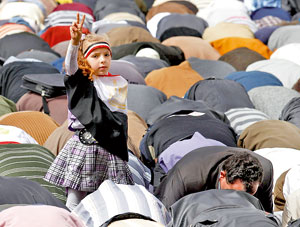LONDON - Anyone who has read The Yacoubian Building, a novel published in 2002 by the Egyptian author Alaa-al-Aswany, will regard the revolution in Egypt as long overdue. The novel's readers will not have been astonished by the ease with which the rotting hulk of Hosni Mubarak's regime was dashed against the rocks, nor by the spirit and courage of those who engineered this extraordinary piece of history.
First things first: it is a very funny and perceptive book about the characters occupying a fashionable Cairo apartment block (which really exists) and squatting in hovels on its roof. Like the crumbling "Majestic" hotel in J. G. Farrell's novel Troubles, about the end of British rule in southern Ireland, the eponymous apartment block was a metaphor for the state, and its inhabitants are figures representative of different aspects of Mubarak's Egypt.
 |
| A girl shows a victory sign during prayers at Tahrir Square, in Cairo February 25, 2011. Egypt's new military rulers, promising to guard against “counter-revolution”, faced political pressure on Friday to purge the cabinet of ministers appointed by Hosni Mubarak as thousands of protesters gathered in Cairo. REUTERS/ |
I suppose that censors never have much of a sense of humor, and that irony and parody are usually beyond their intellectual grasp. But I did find it curious that The Yacoubian Building was not banned in Egypt - or in other Arab countries - and that subsequently it was turned into a popular and widely shown film.
Al-Aswany told his readers so very clearly what was wrong with modern Egypt, while also demonstrating that, despite the corruption and the dead hand of the security police, Cairenes fizzed with personality and showed a feisty urban grace.
So, now that the Yacoubian state has come tumbling down, the most interesting question is not "Why did it happen?" but "Why did it not happen before?"
For years, we in the West — shame on us — talked up democracy around the world, but, despite the occasional gentle slap on the wrist of Arab despots, we accepted that there was an Arab exception to the desire for freedom and accountability. We allowed convenient cultural stereotyping to sustain what we believed was the expedient pursuit of our national interest.
While research by the Pew Centers suggested that the aspirations of families in the Middle East were similar to those elsewhere, many of us went along with the comfortable delusion that Muslim-majority societies couldn't manage and didn't want democracy. Did no one visit Turkey or Indonesia?
This stance conveniently avoided rows with oil dictators. Moreover, provided they were not too troublesome politically over Israel, they could earn a well-paid seat at our table. They didn't have to like Israel, provided that they weren't too rude about America's pro-Israel bias and its refusal to accept that insisting on Israel's inalienable right to exist was not the same as allowing Israel to do whatever it wanted.
Many Arabs themselves knew what was wrong with their region. Back in the early 2000s, the United Nations Development Programme published two reports by Arab public servants and academics that examined the factors underlying the economic stagnation of much of the Middle East. In too many countries, they found women were marginalized (though, to be fair, not in Tunisia), education was dominated by religion, and government was autocratic, unaccountable, and corrupt.
Despite all the oil and gas below the desert sand, growth lagged and unemployment soared. Young men and women throughout the region found their hopes dashed, and sometimes turned to militant Islam as the only alternative to a repressive state.
What happens next? Well, perhaps for a start, those of us who live in democracies will resist future suggestions that this or that country is immune to the charms of liberty, the rule of law, and representative government. If there is no "Arab exception," there is no "China exception," either.
More immediately, we in the West should avoid the conceit that we were somehow the heroic behind-the-scenes progenitors of fundamental change in Tunisia and Egypt. Instead of talking a great game about democracy - for which we would earn Arabs' justified contempt - we should offer with humility and generosity practical assistance in managing the change to more open societies.
The European Union, for example, has been light on assisting the development of the rule of law, good policing, and representative institutions in the Arab world, despite a development and political compact with its governments. For countries that want such assistance, there is quite a lot of money in the EU's pockets for this sort of work.
We should also understand that the climate has changed in regard to the "non-process" that has failed so lamentably to deliver Middle East peace. Israel's failure in recent years to negotiate seriously and responsibly with the Palestinians means that it will now have to consider its diplomatic options against the background of an Arab world in which governments will be obliged to listen more closely to their citizens' views on Palestine.
America's military commander in Afghanistan, General David Petraeus, and others have drawn attention to the damaging impact of America's pro-Israel bias on its interests in some of the world's most geopolitically sensitive regions. Maybe now they will gain the hearing that they deserve.
For all the gloom with which 2010 ended, the new decade has begun with a glorious example of the indefatigable courage of the human spirit. What lies ahead will not be easy. But better and more hopeful? You bet.
Chris Patten, the last British Governor of Hong Kong and a former EU Commissioner for External Affairs, is Chancellor of the University of Oxford.
Copyright: Project Syndicate, 2011. Exclusive to the Sunday Times |


